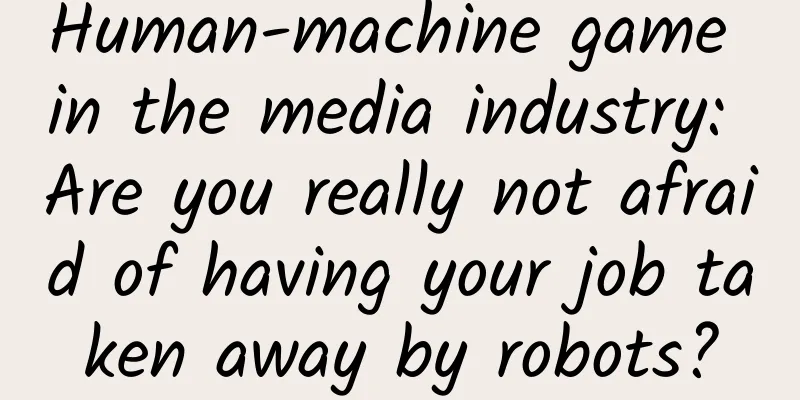Human-machine game in the media industry: Are you really not afraid of having your job taken away by robots?

|
“Have you ever thought that your job will be replaced by robots one day?” Whenever I am asked this question, my first reaction is that it probably won’t happen that soon. Artificial intelligence has gradually replaced human labor in many fields. But when it comes to the media industry, although there are news circulating that some robots can replace reporters in writing articles, it always seems that it is still very far away from us. But what is the real situation? How far are media professionals from massive unemployment? The transformation and reshaping of media ecology under the impact of intelligent technology In March this year, AlphaGo defeated Go master Lee Sedol, which made people realize that AI has begun to master and possess strong autonomous learning capabilities and can make autonomous decisions in complex environments. The breakthrough progress of artificial intelligence is accelerating the new changes in the media industry at a lightning speed. At the 2016 Tencent Media Summit with the theme of "The First Year of Smart Media", Tencent Group Senior Executive Vice President Liu Shengyi said, "We are in the midst of a media industry revolution brought about by artificial intelligence: intelligence will reshape the relationship between people and media, people and information, bring about new organizational forms, production methods, and product forms, and subvert and reconstruct the media ecosystem." So what kind of industrial revolution will artificial intelligence bring to the media? According to the "Advent of Smart Media and the Boundary between Man and Machine: China New Media Trend Report (2016)" jointly released by Penguin Intelligence and Tsinghua University New Media Research Center, the human-dominated media form has begun to be broken, and the interactive integration of various intelligent objects and new technologies has promoted new changes in the media industry chain, which is specifically manifested in the following five aspects: 1. In the near future, machine algorithms and artificial intelligence will change the media information distribution mechanism and continuously improve the personalized matching between content and readers; 2. In the medium term, data mining and semantic technology will promote the upgrading of machine creativity and greatly expand the boundaries of automatic writing; 3. In the medium term, the continuous iteration of new technology clusters (VR/AR, Internet of Things, etc.) will provide new imagination space for media content production and presentation; 4. In the medium and long term, artificial intelligence, big data, the Internet of Things, VR/AR technologies, etc. will penetrate the entire media chain, moving from model innovation to ecological reconstruction; 5. In the more distant future, its intelligence and humans will upgrade together through mutual learning and training, and ultimately complete the smart media revolution. AI controlling humans? That's just a sci-fi movie! When AI is for everyone, what kind of disruption will happen to the human-machine dialogue interface? Will human journalists be replaced by robots? In the face of this problem, Jerry Kaplan, a scientist, futurist, and author of "The Age of Artificial Intelligence," admits that in the near future, some low-skilled, single, and repetitive jobs will soon be replaced by artificial intelligence. However, jobs that are relatively safe are those that require a complex work environment and require the ability to come up with solutions at any time and quickly adapt to social changes. In other aspects, artificial intelligence can better help the development of the media industry. As we all know, the business model of most media relies on advertising, and then allows our advertisers to reach their audiences through media platforms. Therefore, there are two ways to convert our media audience into commercial value. One is the size of our audience, that is, the larger the audience, the greater the value. Another equally important thing is that we need to know the attributes of the audience so that advertisements can be accurately matched. Artificial intelligence can help our media achieve commercialization in this regard. How does artificial intelligence do this? First of all, our current applications are very simple and can quickly expand our audience and media. For example, automatic chat tools can analyze a large number of conversations between real people to simulate human conversations. In addition, it can produce customized news. For example, our artificial intelligence can automatically generate new news and send it to different audiences. Artificial intelligence can do more than that. Machine learning technology can also make our advertising more accurate and directly reach those audiences who are likely to return your visit. This is far more than the analysis of population structure. Artificial intelligence technology can better match the audience because it can abandon human subjective judgment and find some unexpected connections that we cannot find. Therefore, it is difficult for human experts to find such regularities in market decisions, but machine learning can find such regularities without any obstacles. At the same time, Jerry Kaplan also made some predictions about the future. He believes that we will have some new devices and applications in the future that are closer to individual needs and more helpful. They can improve our communication with people around us, including the connection between things in our environment, rather than isolating us; it will expand our reality, rather than let us devote ourselves to our own virtual network space. For example, we will have new progress in hardware. Today's hardware may require us to focus before we can use it, but new devices may be invisible in the future and will not affect our work. We can wear some wireless headphones, or some transparent glasses, or for example, contact lenses, so that we will not have any obstacles to communicating and listening with others. Current equipment has such problems, and new equipment will be able to improve the way we communicate with the surrounding environment. In general, the future of artificial intelligence is very bright. This is also a very exciting era for the media, because artificial intelligence can enable us to better reach more audiences and interact with them. Therefore, as long as you work hard enough and are wise enough as a media person, artificial intelligence will only work for you. As a winner of Toutiao's Qingyun Plan and Baijiahao's Bai+ Plan, the 2019 Baidu Digital Author of the Year, the Baijiahao's Most Popular Author in the Technology Field, the 2019 Sogou Technology and Culture Author, and the 2021 Baijiahao Quarterly Influential Creator, he has won many awards, including the 2013 Sohu Best Industry Media Person, the 2015 China New Media Entrepreneurship Competition Beijing Third Place, the 2015 Guangmang Experience Award, the 2015 China New Media Entrepreneurship Competition Finals Third Place, and the 2018 Baidu Dynamic Annual Powerful Celebrity. |
<<: Mercedes-Benz new E-class starts at RMB 422,800
>>: From Roewe RX5 to MG ZS, why are Alibaba's Internet cars more reliable than Tesla?
Recommend
These 5 conditions in the mouth may be a warning sign of cancer! One is very common and should not be ignored.
Oral cancer is one of the 10 most common cancers ...
I encountered a lizard three times while on an outing, and it seemed to be the same one?
If you see a small lizard running among the grass...
What is the configuration for renting a server in the education industry?
Education is a sunrise industry and the market de...
Tesla's deliveries in Q1 2022 reached a record 310,000 vehicles, up 67.5% year-on-year
While major global automakers struggled with part...
Making web pages, writing copy, pattern design, code development... Can GPT-4 replace me at work?|Base Construction
In the Iron Man movie series, there is an impress...
iOS 8.3 makes some users unable to use Touch ID payment function
[[131544]] On April 10, according to foreign medi...
Practical techniques for obtaining effective traffic in early Internet startups!
Practical methods for obtaining effective traffic ...
What are the steps to make a short video? What is the short video production process?
Many people who do short video live streaming are...
World Milk Day - Learn about the nutritional value of milk and tips on how to choose it
Copyrighted images from the gallery, unauthorized...
Which industries are suitable for bidding for OCPC? Urgent, waiting online!
We all know that Baidu recently updated its backe...
The International Champions Cup China is coming. Has LeTV Sports incubated a football sub-ecosystem?
LeEco is an Internet company known for its "...
Is there no place for medical soft-text promotion anymore? Sogou follows Baidu in launching a big move!
Following Baidu's release of the " Notic...
Layoffs, unpaid wages, and property sales: LeEco's US strategy is now in tatters
In 2016, China's star tech company LeEco made...
"Zero Additive" is prohibited! The new national food safety standard is here, what does it mean to us?
Recently, the National Health Commission and the ...
What are the differences in the competitive strategies of the new brands "Jiang Xiaobai" and "Lianglu"?
If you were to ask: In the current liquor market,...







![[Optimization Tips] Headline Information Flow: Do you know all these tips?](/upload/images/67cc326d2cf5c.webp)

